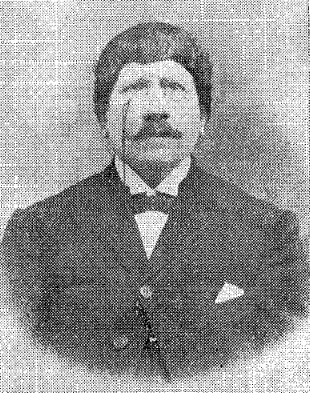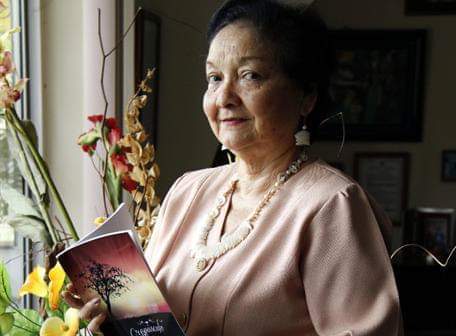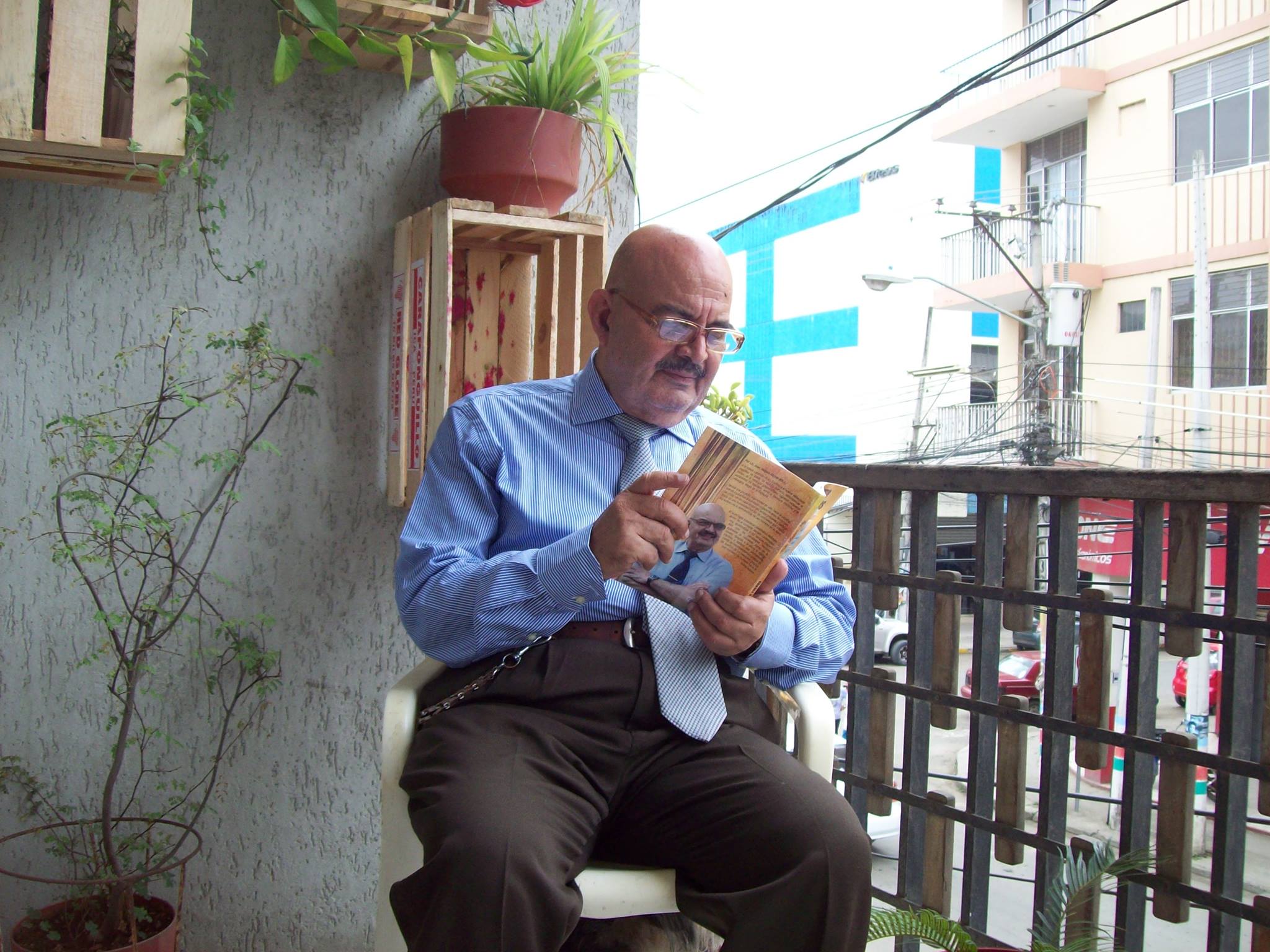Juan Eusebio Molestina Matheus (Guayaquil, 1850 – ?) was an Ecuadorian poet and playwright known for his poetic dramas. His dramatic career crossed the year 1895, which marked the end of romanticism and the beginning of modernism in Ecuador. Molestina’s play Espinas y abrojos (Thistles and Thorns), performed in Guayaquil in 1898, exemplifies the theater known as criollista and is considered a precursor of realist and social theater. While the exact date of his death remains unknown, records indicate that he continued working at the Customs House in Guayaquil until at least 1922.
Early Life and Education
Juan Eusebio Molestina Matheus was born in Guayaquil, Ecuador, in 1850, to José María Molestina y Roca, head of the Freemasons in Ecuador, and Amelia Matheus y Miró. His early education took place under Don Tomás Martínez, where his talent for poetry was already evident. He continued his studies at the San Vicente del Guayas school, earning a degree as a Bachelor and Accountant. Following his graduation, Molestina worked for several commercial houses in Guayaquil and later for the Banco Comercial y Agrícola, where he remained until 1895.
Personal Life
Molestina married Amalia Caamaño y Villegas, with whom he had at least one daughter, Rosario, who possibly died young, as there are no further mentions of her in his works. He maintained strong liberal convictions throughout his life, often expressing them in his poetry and plays. His political engagement led him to publicly protest events such as the Civil War in 1885 and the executions during political unrest in Ecuador. His personal relationships influenced much of his work, often drawing inspiration from his social circle and family events.
Literary Career
Molestina began his literary career in 1876, focusing on poetry and drama. His first major work, Eufemia la costurera, a four-act poetic drama written in 1878, was staged at Teatro Olmedo in Guayaquil. His style was heavily influenced by the Romantic tradition, which persisted in his works even as modernist currents began to emerge in Ecuador.
He is best known for his poetic dramas, such as Las penas del trobador (1883), El poeta y la coqueta (1885), and Espinas y abrojos (1898). His plays often featured dramatic themes and moralistic undertones, drawing upon both urban and rural Ecuadorian life. His theatrical works, particularly Espinas y abrojos, are considered precursors to realist and social theater in Ecuador.
Throughout his career, Molestina participated in numerous literary contests, including those commemorating historical events and figures. His poem Rocafuerte en la epidemia del año 42 was notable for its use of décimas, a traditional poetic form in Ecuador’s coastal region. He was also a prolific writer of satirical and humorous works, often utilizing exaggerated language and absurd dialogues to entertain his audiences.
Despite the growing influence of modernism in Ecuador, Molestina remained a committed Romantic, untouched by the newer literary trends. His works, characterized by emotional depth, drama, and occasional humor, were well-received by the public, even if they sometimes appeared outdated by contemporary standards.
Legacy
Molestina’s contribution to Ecuadorian theater and poetry left a lasting impression, particularly through his poetic dramas, which were among the earliest examples of criollista (nationalistic) theater. His work bridged the gap between Romanticism and the early stirrings of realism and modernism in Ecuadorian literature.
Although his dramatic style was later criticized for being overly sentimental and melodramatic, Molestina was admired for his ability to capture the emotions of the era. His influence persisted in Ecuadorian folklore and popular culture, particularly through his distinctive, often exaggerated style, which became known as “molestiniano.”
Public Reception and Cultural Impact
Molestina was a beloved figure in Guayaquil’s literary scene, widely admired for his contributions to both poetry and theater. His works were regularly performed at the prestigious Teatro Olmedo, which served as a cultural hub in the city, showcasing his poetic dramas to enthusiastic audiences. These performances, particularly of works like Espinas y abrojos and Las penas del trobador, helped solidify his reputation as a key voice in Ecuadorian theater, blending traditional romanticism with emerging nationalistic themes.
In addition to his success in the theater, Molestina’s poetry found a receptive audience through publication in local newspapers and literary magazines, which were crucial outlets for the dissemination of literary work during his time. His ability to connect with readers on both an emotional and intellectual level contributed to his popularity, making him a recognizable figure in Guayaquil’s vibrant literary community.
Molestina’s influence extended beyond his lifetime. In 1932, well after his active years, the renowned Ecuadorian musician Nicasio Safadi set Molestina’s poem Virgen Pura to music. This adaptation not only introduced his work to new audiences but also added to his legacy by embedding his literary contributions into Ecuadorian musical culture.
Poems
PRIMAVERAL
A mi apreciado amigo Tomás Carlos Drouet
Por un camino grandioso
Voy dentro el bosque frondoso
Sin temor,
Al contemplar el paisaje
Me entusiasma del ramaje
El verdor.
¡Excelso pensil de flores
Donde canta sus amores
El turpial!
¡Un Genio, lo diviniza,
Pues el aura se deslisa
Divinal!
El ramaje que se enlaza
Los rayos del sol rechaza
Pertinaz,
Acoje vistosas aves
Que elevan arpegios suaves
A Jehová.
De esas aves el concierto
Alegra el fecundo huerto
Del Señor,
Y las selváticas flores
Le regalan sus olores
Al cantor.
Las insaciables palomas
Entonan allá en las lomas
Su arrullar,
También cantan los olleros
Y se oye de los jilgueros
El gorjear.
Muchos árboles gigantes
Entrelazan arrogantes
Su verdor,
Confundidos se enaltecen
Y sombra al viajante ofrecen
Con primor.
Vuela el viento rumoroso
Y se oye en el bosque umbroso
Rebramar,
Su soplo que diviniza
Las olas del lago enriza
Como el mar.
En un arbusto florico
Una ave calienta el nido
De su amor;
Y duermen las mariposas
En las corolas preciosas
De la flor.
Viendo el bosque me extasío
Y siento el corazón mío
Revivir;
Porque su belleza es tanta
Que tiene un poder que encanta
Mi existir.
Sin duda el Eterno quiso
Fundar otro Paraíso
Terrenal,
Y reformó caprichoso
Este bosque primoroso
Sin igual.
1908
Seráfica
Te amo cual ama el picaflor selvátíco
El rico aroma de temprana flor,
Como idolatra enamorado el céfiro,
Todas las flores de excelente olor.
Tu dulce acento es la expresión armóníca
Que acá en mi pecho resonando está;
Llegan sus ritmos á mi ardiente espiritu
Y hacia el Empírio su sonido vá.
Tú eres de mi alma la visión Seráfica Que por consuelo en mí camino hallé,
Eres la estrella cuya faz espléndida
Alumbra mis amores y mi fé.
Sin tí yo fuera un amador frenético,
Pues me agobiara del pesar la cruz,
Mi vida fuera como noche lóbrega
Si no obtuviera de tu amor la luz.
Te amo cual ama el desmayado náufrago
El instante feliz de salvación,
Como ama el pecador la Fé simbólica,
Como Jesús amó la Redención.
Mi amor es puro, sin igual, sin límites,
La llama siento de mi amor por tí;
No me hagas padecer que siento vértigos
Desde la hora fatal en que te ví.
1903
A la señorita
MARIA LUISA PIÑERES
Vestida de azul y blanco
Una visión pareciste
La tarde que me pediste
Tiernas trovas de amistad;
Accediendo á tus antojos
Hoy te ofrendo estos renglones,
Endechas ó vibraciones
De afecto y sinceridad.
Eres la blanca paloma
Del prado de los amores
Con ojos arrobadores,
De magnética atracción,
Los contemplo y me extasío
Oyendo tu dulce acento
Que ligero como el viento
Penetra en mi corazón
Incógnitas son las alas
De tu alma inocente y pura,
Arrogante es tu figura
Y tu carácter social,
Y las brillantes virtudes
Que simbolizas galana
Las hechizó una mañana
Una Ninfa divinal.
Y desde entonces, María,
Eres la encantada diosa
Que se ostenta primorosa
Del Guayas en el Harén;
Te cantan los trovadores
Con rítmica melodía,
Y te obsequian su armonía
Todas las aves también.
1905
EN EL CEMENTERIO
Con el alma consternada
Hoy me postro, madre mía,
Ante tu lápida fría
A exponerte mi aflicción;
Son de amor las expresiones
Que brotan de mi quebranto,
Es inagotable el llanto
Que mana mi corazón.
Vivo inquieto y solitario
Bajo el yugo del tormento,
Y me nubla el pensamiento
El recuerdo de tu amor;
Pues que fuiste en la existencia
Una estrella de bonanza
Que en el valle de esperanza
Me lanzaba resplandor.
En la vida te adoraba
Como los peces al río,
Cual las flores al rocío,
Como los hombres á Dios;
Considera mis angustias
Y también mi desventura,
Hoy que ante la sepultura,
Te doy el supremo adiós.
¡Dios bendiga tus reliquias
Y de tu loza la calma;
Sí, Dios que consagre tu alma
Y la tenga en el Edén;
Mientras tanto, madre mía,
Lloraré mi mala suerte,
Y deploraré tu muerte
Y mi infortunio también.
¡Adiós madre idolatrada!
¡Adiós, oh sol, bendecido!
Siempre, siempre compungido
Por tu alma yo rogaré;
Tu serás mi pensamiento
En la noche y en el día,
Tus recuerdos, madre mía,
Por siempre veneraré!
1900
Works
- Acordes de mi lira (1912; poetry)
- Manojo de siemprevivas (1916; poetry)
- Eufemia la costurera (1878; play)
- Las penas del trobador (poetic drama; 1883), read the 1911 edition for free here.
- El poeta y la coqueta (poetic drama; 1885)
- La duquesa y la aldeana (musical comedy; 1910), read it for free here.
- Espinas y abrojos (1910; poetic drama)
- El Conde y el Marques (play)
- El hijo de la Duquesa (play)
- Espinas y abrojos (play)
- Cantos primaverales (poetry; 1909), read it for free here.



